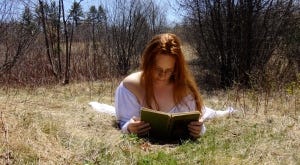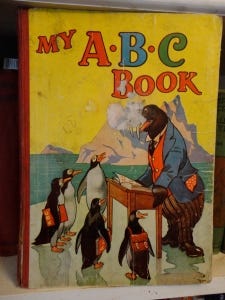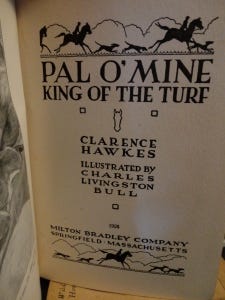Sheer Twaddle

That's a 1922 children's novel I'm holding…
When I first started writing stories for my children, my ex-husband looked at them and said “you’re using too many big words, you know.” Well, since I was told in highschool by my English teacher to stop using so many big words, this stung, and I started looking into how to write for children. After a while of this research, I decided to throw it all out and write from my heart. This was before Vulcan’s Kittens, but it was at the heart of writing that book, as well.
I refuse to write twaddle for children. I am not going to write according to some arbitrary grade-level yardstick that dictates how many syllables each child’s vocabulary should have at a given age. I learned to read at about age 4, and I was, by fourth grade, reading at above college levels according to the tests homeschoolers have to take. I know very well that my reading development was not normal, I have four children and they have all learned and progressed at different levels. However, the ‘big words’ I kept getting taken to task for were learned by reading. Sometimes I would stop and look things up, other times I deduced what the word’s meaning was from context.
If I write with a limited vocabulary, I take that away from my child readers, and make my stories tepid for older or more advanced readers. I’m not advocating writing with a turgid style and polysyllabic vocabulary, but rather refusing to talk down to my audience, even if they are children and I am an adult. It used to be that children’s books were what appealed to children, even if written initially for adults. Now, the divisions are more rigid. When I was working in the library, the divisions were early readers (picture books), meant to be read aloud by parents; EZ Readers, meant for those just beginning to read; chapter books, or the “J” section, which might be broken even further down into different reading levels; and finally, YA, or young adult books, which have appeal all the way up into adulthood, and often deal with more problematic issues.
I do understand that for younger readers, it could become frustrating to try and read a book so far over their heads that they can’t understand it. But I think that the child should be allowed to read what they want, and if they want a challenge, they can get it. When I was a girl, about ten at the time it happened, I had gone through all the books in the children’s section and was denied access to the adult section of the library. I know there are reasons librarians do that - there are books emphatically unsuitable for children in most library collections - but still, I was ready for a challenge. I wound up reading, instead, the entire collection of Edgar Rice Burroughs’ work that was tucked into a dusty storage room, because she considered them children’s books.

This one dates to about 1900 I believe.
The history of children’s literature is blurry, at best. Picture books, and moral tales written nominally for children, but meant for parents, have been around for a very long time. Novels written for children saw their golden age first in the mid eighteenth century well into the nineteenth century. Some of those have endured, becoming the classics I remember with fondness. Now, however, a modern child - my daughters, specifically - will turn up their noses at those books in favor of modern books. Why?
Well, I’d argue that a big part of it is the style differences. Back a hundred years or more, the educational standards for those who were reading these novels were a bit higher than they are now. Also, the English language, if you haven't noticed, drifts. Some words don't mean what they once did. In addition, there is a school of thought that dictates, as I mentioned above, that books written for children now must adhere to some strictures of limited vocabulary. Certainly another problem is that life has changed. In an internet world, reading tales of farm life, outdoors adventures, and travel by sea seems strange, like reading about an alternate universe. For those of you seeking free classics of children’s literature, look at this super list on Project Gutenberg. I’m not advocating that the old books should be tossed aside, certainly. Remembering the past is important, especially for children. They absorb history in books like Captains Courageous, and Call of the Wild. They can see an adventure that is rarely found in today’s books. As a children’s librarian, I saw that fantasy books are very popular right now, and my guess would be that they give their young readers those adventures all over again in an unreal world that contrasts with our sedate civilized existence (as seen through young eyes). I was reading a ‘mommy blog’ I’d stumbled across the other day, where a mother writing about her sixth-grader went on at breathless length about her son’s misbehaviour. What had he done? Why, he and a friend had gone to the park, and were gone, by her account ‘a few minutes’ before she tracked him down, hauled him home, and grounded him. Is it any wonder young ones seek adventure?

A boy and his horse get caught up in the Civil War… adventure stories are always popular.
So I’m writing, when I do for a younger audience, with a sense of wanting to teach. Words they may not know will go into the mix, along with concepts of history, honor, and adventure. I’m not going to write twaddle for my children, or for yours. When my young readers challenge me on Sekhmet’s parentage, I’ll sent them some of my research, but delightedly counter-challenge them to research on their own to learn more about the mythology and history I put in my books. Because I do write in the internet era, and I can make my books interactive that way. I’m going to resist writing twaddle, and try to steer my children away from reading it.
Nor am I advocating that children should only be allowed to read ‘elevating’ or ‘educational merit’ books. There’s a lovely essay on the Defence of Reading Rubbish by Peter Dickinson that I highly recommend. I was pointed at it by Kathryn McCrary, who also told me that she was not allowed, as a girl, to read Nancy Drew or Hardy Boys, both series that have endured through decades of child enjoyment despite being labeled trashy. Speaking of learning more about children’s books, try this little quiz out. So what do you remember fondly reading as a child? Could you go back and read it now? What words did you learn in books, and can you pick up a sixth-grade level book now, and enjoy it?



